|
|
|
Sort Order |
|
|
|
Items / Page
|
|
|
|
|
|
|
| Srl | Item |
| 1 |
ID:
166012
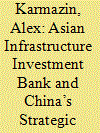

|
|
|
|
|
| Summary/Abstract |
Creating the Asian Infrastructure Investment Bank (AIIB), a multilateral development bank initiated by the People’s Republic of China, has been one of the key symptoms of Xi Jinping’s ambitious “China Dream” foreign policy. The previous studies mainly focused on providing a description of AIIB’s creation or general motives and context through which they explicated the establishment of the Bank. Building on the literature focused on strategic culture and grand strategy, I supplement the general motives of AIIB’s creation by characterizing the style and process of AIIB’s materialization. I argue that the style (procedure) of AIIB’s implementation largely resembles the previous Dengian model of strategic procedure which Deng himself described with the Chinese saying “crossing the river by touching the stones” which evinces flexibility and “step-by-step” characteristics in its procedure. This helps to illustrate that China’s engagement with the international order can be adaptive to a significant degree and China does not necessarily follow a pre-planned vision of how to take over international (institutional) order. While China’s foreign policy in some areas is often regarded as being assertive and rigidly defending its positions, AIIB is a different case to a high extent. Moreover, analyzing the creation of AIIB indicates ambiguity of Xi’s foreign policy regarding general aims it wants to achieve and identities on which it should be based.
|
|
|
|
|
|
|
|
|
|
|
|
|
|
|
|
| 2 |
ID:
181921
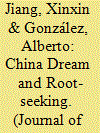

|
|
|
|
|
| Summary/Abstract |
This article examines the contemporary practice of nationalistic rhetoric in Chinese society through the singing competition franchiseThe Voice of China. By employing the concept of ideograph, the authors explore how the show successfully incorporates the Chinese Communist Party’s nationalistic goal of promoting a unified and strong China to both the domestic audiences and the global Chinese community by relying on the persuasive and affective power of slogan. Specifically, the authors analyze and — two political and cultural slogans articulated in a variety of sonic representations and in contestants’ performative statements. The authors argue that while popular culture products in contemporary China continue to be sites of political propaganda, they are able to apply new media-influenced rhetorical strategies to reflect popular sentiment.
|
|
|
|
|
|
|
|
|
|
|
|
|
|
|
|
| 3 |
ID:
155645
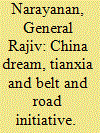

|
|
|
| 4 |
ID:
129713
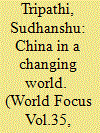

|
|
|
|
|
| Publication |
2014.
|
| Summary/Abstract |
With the recent change in the erstwhile leadership in China, the new leader President Xi Jinping has elucidated his vision as the "China Dream", Which sets out a new package of reforms on the anvil with a view to ensure economic progress matching with its rising population and their so rising aspirations and expectations, besides enlarging its sphere of influence in its vicinity and also in far flung areas of the world in its all-out efforts to not only maintain its regional predominance but also to achieve a big leap forward so as to be recognized as a dominant and responsible player in international relations against its long held desire to proceed toward assuming the role of a global hegemony next only to the US through replacing the US must be its ultimate goal hidden under the cloak of its economic-militaristic aggressions which is witnessed in its aggressive imperialist policies all over the world as it has not yet overcome from its age-old middle Kingdom complex.
|
|
|
|
|
|
|
|
|
|
|
|
|
|
|
|
| 5 |
ID:
162403
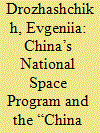

|
|
|
|
|
| Summary/Abstract |
The article investigates how the “China Dream,” set as a national Chinese goal through 2049, is underpinned with achievements in outer space. Deriving from the Carl von Clausewitz hypothesis on “the continuation of political objectives by other means” and referring to Xi Jinping’s official statements that link space achievements to these “other means,” the Chinese national space program (focusing on substantial technical details to elicit evidence of progress and how concrete achievements lead to economic and geopolitical advantages) is examined. This article shows that the increasing number of space assets China possesses, including space-based technologies developed either independently or in mutually beneficial partnerships, are crucial for advancing socialism in the Chinese context and in altering the current global balance of power in a more favorable way to China.
|
|
|
|
|
|
|
|
|
|
|
|
|
|
|
|
| 6 |
ID:
167317
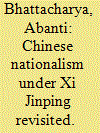

|
|
|
|
|
| Summary/Abstract |
In China, nationalism that took root in the era of globalization under the third-generation leadership of Jiang Zemin is principally meant to address the internal threats challenging party legitimacy and stability and not to resist the foreign enemies, as was the goal in the twentieth century. This is because internal stability is considered prerequisite to harness the potentials of globalization. Paradoxically therefore, nationalism and globalization, that are antithetical forces, go hand in hand in China. Under the current leadership, both the forces of nationalism and globalization are underscored in Xi Jinping’s dream project- the Belt and Road Initiative (BRI). Notably, the success of BRI is contingent on the persistence of globalization externally. But the rising trends of de-globalization in the West do not augur well for the BRI that has been envisaged to not only meet the demands of a slowing economy but to expand China’s global footprints, and thereby, fulfil the China Dream. Therefore, a sense of insecurity pervades Chinese nationalism. This ‘insecure’ nationalism under Xi Jinping is engendering a belligerent turn to Chinese foreign policy.
|
|
|
|
|
|
|
|
|
|
|
|
|
|
|
|
| 7 |
ID:
149645
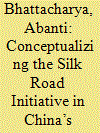

|
|
|
|
|
| Summary/Abstract |
While the Silk Route Initiative (SRI) appears to be a novel foreign policy strategy under Xi Jinping’s leadership, it is integral to China’s periphery policy (zhoubian zhengce). Arguably, periphery policy is rooted in the Chinese imperial history and has remained a salient aspect of state formation and foreign policymaking of the post-1949 China. Under Xi Jinping, it has acquired a preeminent foreign policy goal. This study puts the SRI in a historical framework and argues for the centrality of periphery in China’s domestic and foreign policy. Looking at the SRI from the prism of periphery, while suggesting an essential continuity in Chinese foreign policy and strategic thinking, also indicates that periphery is not simply a frontier strategy. Rather, it encompasses the whole gamut of Chinese domestic and foreign policy. Embedded thus in the periphery policy, the SRI is a well thought-out Chinese grand strategy to reclaim its geopolitical dominance in Asia and fulfill the goal of “China dream.” This strategy, in effect, challenges the US dominance and de-centers it from Asia and helps China to create a Chinese-centered order in Asia and beyond.
|
|
|
|
|
|
|
|
|
|
|
|
|
|
|
|
| 8 |
ID:
141450
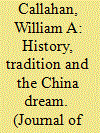

|
|
|
|
|
| Summary/Abstract |
How will China influence world politics in the twenty-first century? Many people answer this question by looking to Chinese history, and particularly to traditional models of Chinese world order. This essay seeks to complicate this question by asking which history, and which tradition? While it is common to look at China's pre-modern history as ‘tradition’, this essay argues that we also need to appreciate how ‘socialism’ is treated as a tradition alongside Chinese civilization. It does this by examining how China's public intellectuals appeal to two seemingly odd sources: Mao Zedong's 1956 speech ‘Strengthen Party Unity and Carry Forward Party Traditions’, and the ‘Great Harmony’ passage from the two millennia-old Book of Rites. It will argue that these two passages are employed as a way of salvaging socialism; the ideological transition thus is not from communism to nationalism, but to a curious combination of socialism and Chinese civilization. This new socialist/civilization dynamic integrates equality and hierarchy into a new form of statism, which is involved in a global competition of social models. Or to put it another way, what these two passages have in common is not necessarily a positive ideal, but a common enemy: liberalism, the West and the United States.
|
|
|
|
|
|
|
|
|
|
|
|
|
|
|
|
| 9 |
ID:
173933
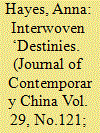

|
|
|
|
|
| Summary/Abstract |
The Xinjiang Uyghur Autonomous Region (XUAR) has been an uncomfortable fit within the Chinese state. However, XUAR’s location on the Silk Road Economic Belt (SREB) has increased the importance of this frontier region and it is now an important element in the Belt and Road Initiative (BRI) and China’s future. Moreover, given the BRI now underpins Xi Jinping Thought on Socialism with Chinese Characteristics for a New Era and Xi Jinping Thought on Diplomacy, XUAR has increasingly become interwoven into the China Dream, the BRI and Xi’s legacy, resulting in serious human rights violations there. This article argues that the repressive control of XUAR demonstrates Beijing’s acute anxiety over opening this region up to external influences, particularly from Central Asian and Middle Eastern SREB states.
|
|
|
|
|
|
|
|
|
|
|
|
|
|
|
|
| 10 |
ID:
140637


|
|
|
|
|
| Summary/Abstract |
On July 17, 2015, People’s Daily announced that a new deputy director of the Chinese Communist Party’s Central Propaganda Department (the official translation has been changed to Department of Publicity in recent years) had appeared at a conference on children’s literature in Beijing. This was the first official notice that Tuo Zhen, the former director of propaganda in Guangdong province, had been promoted to a powerful position in the central government. Tuo had become famous in 2013 thanks to his personal intervention to cut and rewrite key passages of the newspaper Southern Weekend’s New Year’s editorial, hours before it went to press.
|
|
|
|
|
|
|
|
|
|
|
|
|
|
|
|
| 11 |
ID:
168087
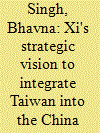

|
|
|
|
|
|
|
|